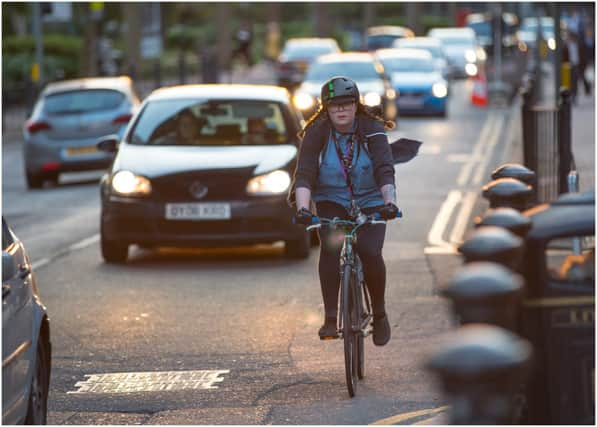Drivers face unlimited fines if new Highway Code rules aren’t followed


Drivers are warned they could face unlimited fines and licence points if they can be proved to be responsible for collisions.
Fresh Highway Code rules were introduced last month meaning drivers who are not mindful of cyclists and pedestrians are now subject to stricter penalites.
Advertisement
Hide AdAdvertisement
Hide AdUnlimited fines can be issued for offences such as driving without insurance and causing death by dangerous driving - while some crimes may include substantial jail time.
What are the new rules?
The new rules lay out a road hierarchy where cyclists, described as the second most at risk on the roads, should be given more priority and now have more rights to occupy space on carriageways.
Cyclists are told to ride in the centre of the lane on quiet streets in slow-moving traffic and when approaching junctions or narrow roads.
The rules also say cyclists “may exercise their judgment and are not obliged to use” their designated lanes.
Advertisement
Hide AdAdvertisement
Hide AdThe Highway code now states: “You can ride two abreast and it can be safer to do so, particularly in larger groups or when accompanying children or less experienced riders.”
When drivers are travelling at speeds up to 30 mph, they are required to leave five feet of space when overtaking cyclists.
If there is not enough room, then drivers should wait behind until they can overtake safely.
When turning, a driver must make sure a cyclist next to them must pass first.
Advertisement
Hide AdAdvertisement
Hide AdAlong with cyclists, horse riders and horse-drawn vehicles also have priority over cars if the vehicle is turning close by.
Mike Thompson, of car rental company Leasing Options, said: “It’s important that both cyclists and motorists understand these new rules as failing to abide by them could cause a collision, which could cause serious injuries and even lead to a hefty fine.
“If the car driver was to blame for a collision, this could be classed as careless and inconsiderate driving which carries an unlimited fine and up to nine points on your licence.
“If the cyclist was to blame, this could result in them receiving a £1,000 fine for careless cycling, according to the Highway Code penalty table.”
What has been said?
Advertisement
Hide AdAdvertisement
Hide AdRoads Minister, Baroness Vere, said: “I’m proud to say we have some of the safest roads in the world, but I’m determined to make them safer still for everyone.
“These updates to The Highway Code will do just that by bringing the rules into the 21st century, encouraging people to respect and consider the needs of those around them, and ensuring all road-users know the rules of the road.”
However, the Highway Code changes designed to boost protection for cyclists have been branded “bonkers” in Parliament.
Conservative former minister Sir Desmond Swayne took exception to new advice for cyclists to ride in the centre of lanes on quieter roads, in slower-moving traffic, and when approaching junctions, to make themselves as visible as possible.
Advertisement
Hide AdAdvertisement
Hide AdSir Desmond, MP for New Forest West in Hampshire, told the Commons: “I cycle for 10 hours a week and on a narrow forest road I always cycle as close to the kerb because I’m a driver too and I want to accommodate drivers.
“The advice in the new code that I should cycle in the centre of the carriageway is bonkers, isn’t it?”Transport minister Trudy Harrison replied: “I’d like to stress that that advice is only on narrow roads.
“And I’m delighted that he has embraced cycling because we too want to see half of journeys made in towns and cities walked and cycled by 2030.”
Nine sections of the Code have been updated, with 50 rules added or amended.
Other changes include guidance for traffic to give way when pedestrians are crossing or waiting to cross at junctions.